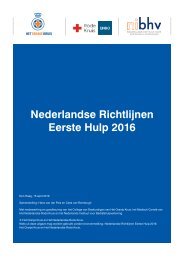Thesis-Anne-Vos-Masters-SBR-and-EU-Law-3
Thesis-Anne-Vos-Masters-SBR-and-EU-Law-3
Thesis-Anne-Vos-Masters-SBR-and-EU-Law-3
Create successful ePaper yourself
Turn your PDF publications into a flip-book with our unique Google optimized e-Paper software.
As set out in Chapter 5, the principle can be used in order to review whether measures of <strong>EU</strong><br />
institutions are legitimate in view of the environmental objectives. The environmental requirements<br />
include the objectives of Article 191(1) TF<strong>EU</strong>, the principles of paragraph 2 (which will be set out in<br />
the following paragraphs) <strong>and</strong> the policies in paragraph 3. These three should be distinguished with<br />
regard to their influence on the judicial review. With regard to the objectives of paragraph 1, it<br />
could be questioned whether the Recommendation contributes (enough) to the preserving,<br />
protecting <strong>and</strong> improving of the environmental quality, the protecting of the human health, the<br />
prudent <strong>and</strong> rational utilization of natural resources <strong>and</strong> finally, the promoting of measures at<br />
international level to deal with regional or worldwide environmental problems (in particular climate<br />
change). It does seem that the Recommendation takes these objectives into account, but it could<br />
be wondered whether this is enough (since it is formally not binding) <strong>and</strong> whether it actually<br />
discourages the prudent <strong>and</strong> rational utilization of natural resources <strong>and</strong> promotion of measures to<br />
combat e.g. climate change. After all, the promotion of the development of shale gas will reduce<br />
the promotion of renewable sources. It could be questioned whether the integration principle could<br />
'require' the Union <strong>and</strong> MS to invest in other sources of energy instead of shale gas. This would<br />
also be in line with the aim of Article 194(1) TF<strong>EU</strong> to promote the development of renewable<br />
energy. Krämer is for example of the opinion that<br />
[T]he Union has spent, from the beginning, too much <strong>EU</strong> money on nuclear energy compared with<br />
expenses for renewable energy; art. 11 TF<strong>EU</strong> would allow a reversal of this policy, if the political will<br />
existed to promote renewable energies. Again, this is a question of policy, not of law; there is no<br />
legal obligation to invest increased sums into the promotion of renewable energies. 423<br />
This line of reasoning can also be found in a statement of a Member of the Dutch Parliament in the<br />
Netherl<strong>and</strong>s who is of the opinion that the extraction of shale gas in the Netherl<strong>and</strong>s would hinder<br />
the transition to renewable energy. Also, the MP states that further research would be a waste of<br />
time <strong>and</strong> energy. 424<br />
The principles of paragraph 2 will be discusses in the following paragraphs. The policy aspects<br />
which the Commission had to take into account are enumerated in paragraph 3. These policy<br />
aspects will probably not lead to the conclusion that the Recommendation was not legitimate,<br />
especially since they are not of much influence in the level of judicial review.<br />
The integration principle also applies to MS in policy areas which have been (partly) harmonised.<br />
This could be argued with regard to the many <strong>EU</strong> directives, regulations <strong>and</strong> other actions<br />
mentioned earlier. In the Netherl<strong>and</strong>s, it could be wondered whether the integration principle has<br />
been sufficiently implemented. This can be illustrated by the Mining Act, which does not involve<br />
environmental aspects (while the Mining Waste Directive does) but only focuses on economic<br />
aspects. This could also be illustrated by the fact that the entire discussion on shale gas is carried<br />
out by the Minister of Economic Affairs. The Minister of Infrastructure <strong>and</strong> Environment does not<br />
seem to be involved. It seems that those are considered as two separate things, which is<br />
remarkable. It would already make a difference if the Minister of Infrastructure <strong>and</strong> Environment<br />
would more explicitly co-sign all the letters <strong>and</strong> Structure Vision on Shale Gas. Now it could give<br />
the impression that only economic considerations are taken into account. The addition of the<br />
Minister of Infrastructure <strong>and</strong> Environment could also contribute to the public acceptance by letting<br />
the public know that the environmental aspects are taken into consideration as well. After all, it<br />
would be too late if the Minister of Infrastructure <strong>and</strong> Environment would be involved once<br />
environmental aspects occur (such as the contamination of ground water or drinking water).<br />
423<br />
Krämer (2011), p. 20.<br />
424<br />
Kamerstukken II 2013/14, 33 952, nr. 8.<br />
88



